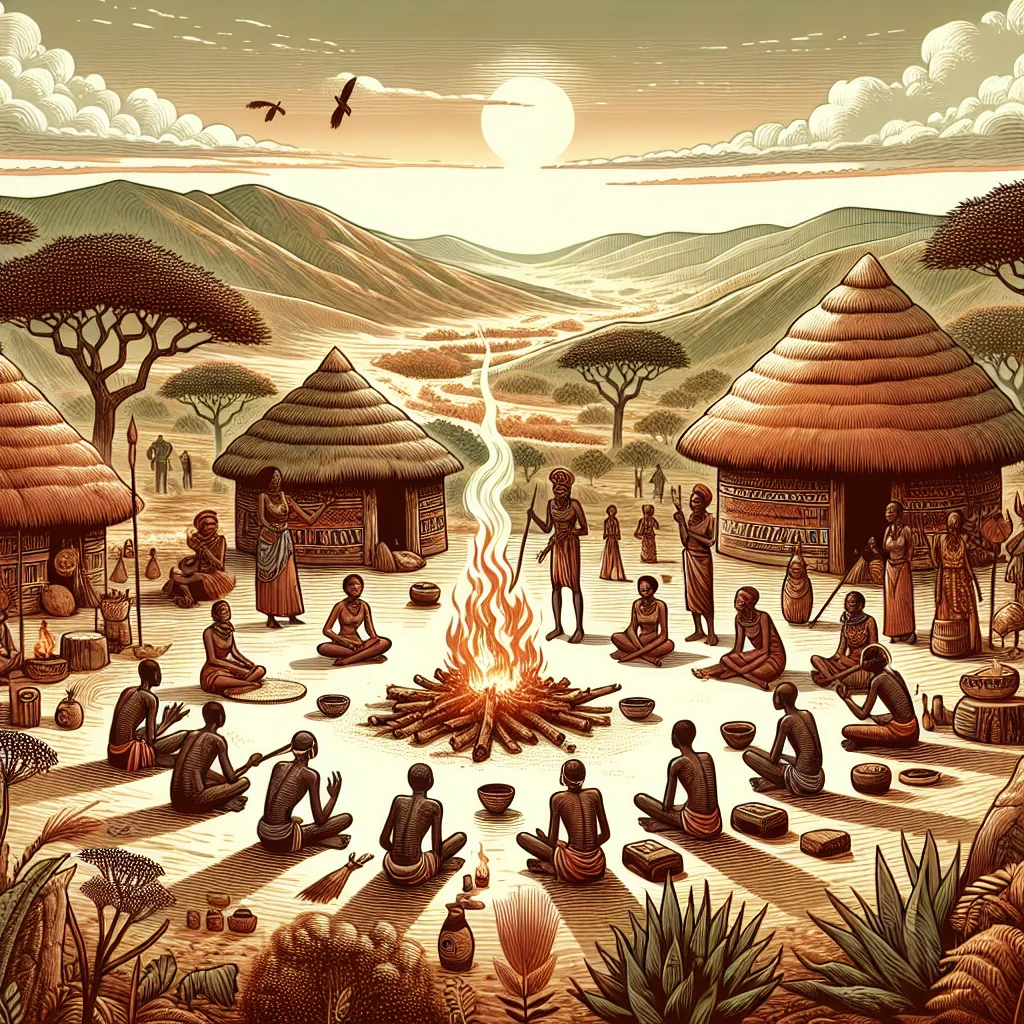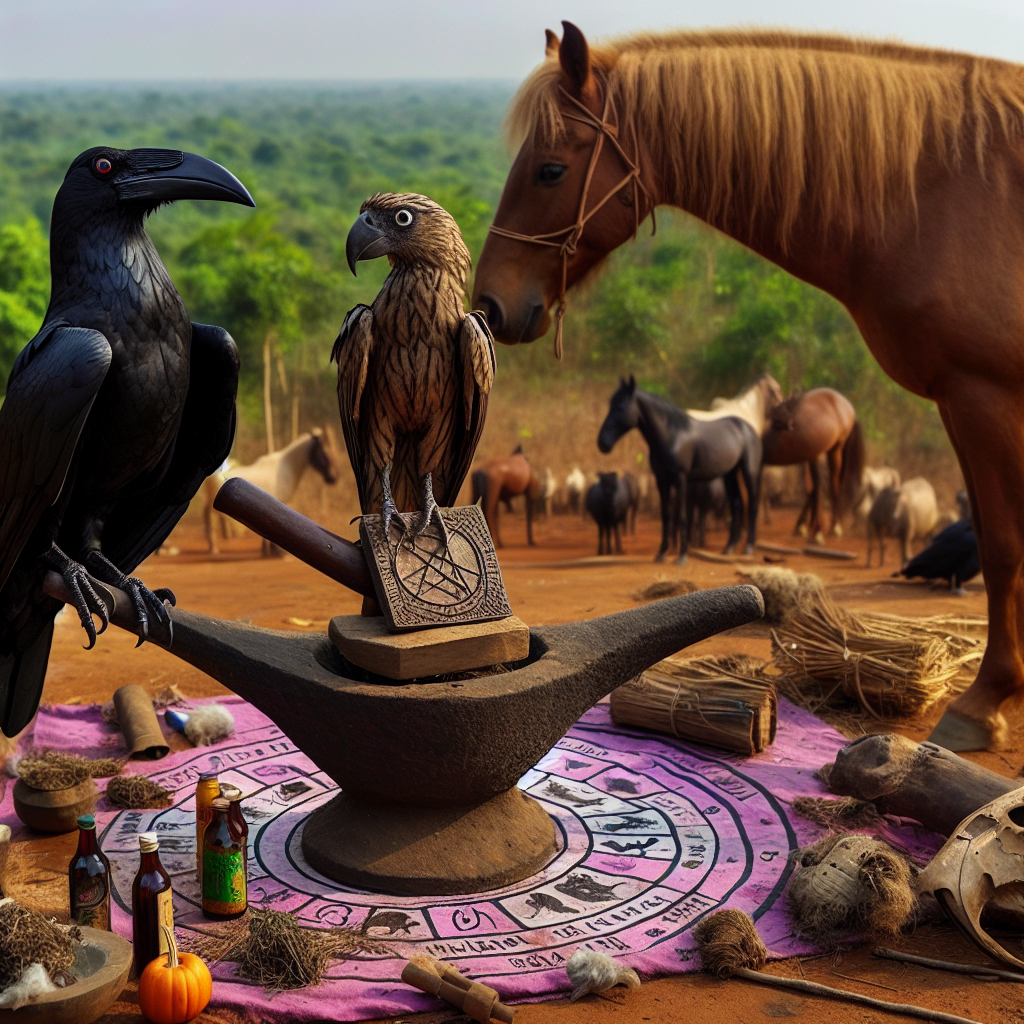As an Amazon Associate I earn from qualifying purchases.

Witchcraft, in various African societies, is as old as the cultures themselves and has remained a potent force through history, pervading the everyday life of many communities across the continent. Defined broadly as the practice of, and belief in, magical skills and abilities exercised by solitary practitioners and groups known as witches, the concept of witchcraft in Africa encompasses a rich mosaic of traditions, rituals, and practices that vary significantly from one region to another.
To understand the historical perspective of witchcraft in Africa, it is essential to delve into the precolonial era, where indigenous belief systems thrived in the absence of external influences. These belief systems articulated a world where the spiritual realm was intimately connected to the material world, and individuals with the perceived ability to exert influence on this spiritual realm were both revered and feared. The existence of witchcraft was typically linked with the explanation of misfortunes and social ailments, ranging from diseases and natural disasters to the death of cattle or failure of crops.
In many African communities, the belief in witchcraft was and, in some places, still is an integral part of the justice system. Accusations of witchcraft have often led to trials and ordeals designed to establish the truth. Although the methods and processes of these trials varied considerably, the conviction of individuals as witches could result in a variety of punishments, including exile, execution, or various forms of restitution. This belief in the supernatural justice administered by or through witches underlines the depth of cultural intertwining that witchcraft has with the social fabric of African societies.
A compelling statistic that underscores the ongoing cultural significance of witchcraft is the fact that in the 21st century, accusations and persecutions related to witchcraft continue in various African countries. According to a report by the United Nations in 2009, in just one year, over 1,000 women in Tanzania alone were killed due to accusations of witchcraft, indicating the deeply entrenched nature of these beliefs within local communities.
The portrayal of witchcraft has not remained static but has evolved with the socio-political changes in Africa. Colonialism, for instance, brought Christianity and Islam, and with them, their own perceptions of witchcraft as heresy or antithetical to monotheistic beliefs. This clash of spiritual paradigms led to a complex reconfiguration of the position of witchcraft within African societies, where it was often vilified and suppressed yet continued to persist as a substantial aspect of the indigenous cultural landscape.
The phenomenon of witchcraft in Africa is not merely a relic of the past but a living, breathing part of many contemporary African societies. It manifests in the ongoing dialogue between tradition and modernity and in the ways that modern legal systems grapple with the challenges posed by deeply held superstitious beliefs. Understanding the historical context of witchcraft is crucial for comprehending how it continues to influence the sociocultural dynamics across Africa.
“`html
When Did Witchcraft Begin in Africa? Tracing the Historical Roots
“`
The practice of witchcraft in Africa is steeped in ancient history, with its origins often lurking in the shrouded pre-colonial period. Traditional African witchcraft, which differs remarkably across various cultures, typically revolves around the belief in supernatural powers used by individuals known as witches. These powers are believed to affect the community’s well-being, causing harm or providing protection through rituals and spells. Although pinpointing an exact start date is challenging due to the oral nature of prehistoric African societies, it is generally accepted that witchcraft has been an integral part of African spirituality and social systems for thousands of years. Witchcraft’s prominence in African cosmology and its impact on societal norms and justice systems persist even in contemporary times. The full exploration of Africa’s witchcraft origins, its evolution, and the cultural significance unfolds in the subsequent sections, offering an in-depth discussion of this complex and fascinating aspect of African history.
The question of when did witchcraft start in Africa is enmeshed in a complex history that spans thousands of years, reflecting the continent’s diverse cultures, languages, and practices. Witchcraft in Africa, known by various names and forms across the continent, doesn’t have a documented beginning. However, looking at historical records, oral traditions, and archaeological findings, it is evident that witchcraft or similar practices have been ingrained in African society since ancient times.
**Historical and Cultural Roots of African Witchcraft**
The earliest evidence of witchcraft-related practices can be traced back to prehistoric times when various forms of animism and shamanism were likely practiced. These spiritual beliefs center on the idea that objects, places, and creatures all possess a distinct spiritual essence. Early humans in Africa, as elsewhere, likely performed rituals and used talismans to influence the forces of nature, heal the sick, or bring about desired outcomes in their lives.
As communities in Africa developed and civilizations like Egypt, Nubia, and the empires of West Africa rose to prominence, more structured forms of what could be recognized as witchcraft emerged. In ancient Egypt, for instance, magic (referred to as “heka”) was a legitimate and integral part of society, used to protect the pharaoh, assist in battles, and communicate with the gods.
Witchcraft in Sub-Saharan Africa has long been a complex mixture of ancestral worship, divination, and the belief in witchcraft. Different ethnic groups and tribes have distinct beliefs; for instance, the Zande people of Central Africa traditionally believe in witchcraft as an omnipresent force, which can explain both good and bad luck.
**The Impact of Colonization on Witchcraft Beliefs**
The practice and perception of witchcraft in Africa dramatically changed with the onset of European colonization. Colonial authorities often demonized African witchcraft practices, equating them with evil and employing that perception to justify the control and conversion of African peoples to Christianity.
Colonial laws were enacted to suppress traditional beliefs. In 1735, the British Witchcraft Act made it a crime for any person to claim that they had magical powers or practiced witchcraft. In a colonial African context, this and similar acts impacted how indigenous African spiritual systems were viewed and labeled.
**Contemporary Witchcraft in Africa**
Despite centuries of external influence, witchcraft has persisted into modern-day Africa with varying roles in society. Some communities continue to actively consult witch doctors, traditional healers, or diviners to solve personal or community-wide issues. In some cases, individuals accused of being witches still face persecution and violence.
Research indicates that belief in witchcraft remains widespread. A 2010 Gallup poll suggested that belief in magic is present in several countries, with numbers indicating that 55% of respondents in Ivory Coast, 60% in Senegal, and 89% in Tanzania affirmed their belief in witchcraft, illustrating the deep-seated nature and persistence of such practices in contemporary African societies.
Witchcraft in Africa, with its ancient origins, remains an important facet of cultural identity, social commentary, and conflict resolution for many communities on the continent. The corresponding beliefs and practices are far from homogeneous, reflecting the continent’s rich tapestry of histories and traditions.
- When did witchcraft practices first begin in Africa?
Witchcraft in Africa has ancient origins, with practices that likely date back to prehistoric times, before written history. However, it’s difficult to pinpoint a precise start due to the lack of written records.
- Which African societies are known for their historical witchcraft practices?
Many African societies are known for their witchcraft practices, including the Zande of Central Africa, the Mende of West Africa, and various other ethnic groups throughout the continent, each with their own unique traditions.
Views on witchcraft varied widely among different African societies. Some viewed it as a positive force when used for healing or protection, while others saw it as a malevolent practice associated with harm and misfortune.
- Was there a distinction between witchcraft and religion in African history?
In many African traditions, there was no clear distinction between witchcraft and religion as both were deeply woven into the spiritual and everyday life, focusing on the interconnectedness of the physical and spiritual worlds.
- Did colonialism affect the practice of witchcraft in Africa?
Yes, colonialism significantly impacted the practice of witchcraft in Africa, often leading to suppression and persecution of traditional beliefs and practices as colonial powers imposed their own religious and legal systems.
- What role did witchcraft play in African communities’ social and political structures?
Witchcraft often played a significant role in social and political structures, serving as a means of explaining misfortune, reinforcing social norms, and sometimes used to accuse or undermine rivals or enemies within the community.
- Are there any documented cases of witch hunts in African history?
Yes, there have been documented cases of witch hunts in African history, some of which were influenced by indigenous beliefs, while others were exacerbated by European legal practices during the colonial era.
- How were individuals identified as witches in traditional African societies?
Identification of witches in traditional African societies varied, involving a range of methods from divination and consultation with oracles to accusations during times of crisis or misfortune.
- Are there any specific rituals or symbols associated with African witchcraft?
Yes, African witchcraft is replete with various rituals, symbols, and artifacts that differ across regions and cultures. Common elements may include the use of charms, spells, and the invocation of spirits or ancestors.
- Is witchcraft still practiced in modern Africa, and how is it perceived?
Witchcraft is still practiced in some parts of modern Africa, though perceptions vary widely. While some see it as part of their cultural heritage, others view it with suspicion or associate it with backwardness due to modern religious and scientific influences.
Conclusion
The historical perspective on the origins of witchcraft in Africa points to a complex tapestry of spiritual beliefs and practices that predate many world religions. Studies suggest that witchcraft, as part of traditional African religions, has its roots in the early societies of the continent, and dates back thousands of years. Key insights from the article highlight that witchcraft served as a means to explain the unexplainable, governing natural phenomena, health issues, and societal events long before the advent of modern science and medicine. It was deeply woven into the fabric of African culture, underpinning justice systems, social hierarchies, and cosmologies, and was often seen as a source of power and wisdom, used by those believed to possess the ability to access the spiritual realm and manipulate forces for good or ill.
The evolution of witchcraft in Africa was significantly influenced by external factors such as the spread of Christianity and Islam, European colonization, and the resultant cultural exchanges and conflicts. These events reshaped African witchcraft, sometimes marginalizing it, other times leading to its syncretism with new beliefs. The article underscores that despite centuries of change, the essence of witchcraft has remained resilient, serving as a testament to the enduring nature of indigenous knowledge systems. It continues to play a role in modern Africa, sometimes clashing with contemporary legal frameworks, yet still offering a connection to ancestral identity and continuity for many communities across the continent.
Amazon and the Amazon logo are trademarks of Amazon.com, Inc, or its affiliates.


